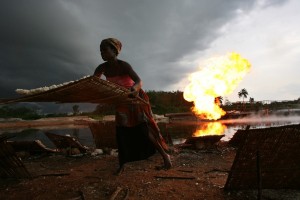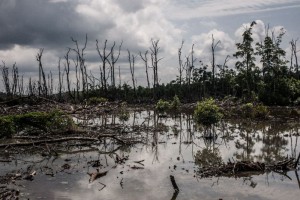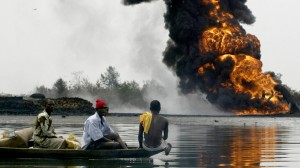
Niger Delta Conflict saw a series of insurgencies in the oil producing creeks of the Niger Delta area of Nigeria, threatening the country’s Oil and gas industry which provides about 85% of the federal government’s revenue. Due to activities of militant groups such as the Movement of the Emancipation of the Niger Delta (MEND), seeking redress for years of exploitation and neglect of their environmentally degraded area, the industry, on and off-shore, has been crippled since 2005.
The Niger Delta conflict was seeded in suspicion of the minority towards the larger ethnic groups- and justifiably so. Chiefs of the Rivers, when Nigeria was to become independent demanded that treaties that incorporated them into the country be revoked. The strength of their argument was in a British Parliamentary paper of 1888 in which King Jaja received assurances from the imperial Queen that the autonomy of his Opobo realm will be protected. The uniqueness of the Niger Delta environment and its geographical terrain, Delta chiefs believed, would escape the understanding and genius of the people of the hinterland. Their area, they predicted, would not be developed. This concerns were waved aside by the Willinks Commission set up in 1957 to examine the case of the minorities. The commission opted for the establishment of an agency for the development of the Niger Delta in respect of its difficult terrain. The Niger Delta Development Board (NDDB) became first among the series of successive failed and not-so-successful efforts (such as OMPADEC, River Basin Authority, and NDDC) to contain the growing discontent in the area. Some three decades later, an activist, Ken Saro Wiwa had predicted “a coming war” unless the needs of the oil producing communities were met; a war that would collapse oil production spectacularly and claim the lives of some 10,000 people.
The Niger Delta conflict did not arise because there were no efforts by the government to address the paradox of the region where poverty prevails in the midst of abundant natural resources. For one, the crisis was enhanced by the dearth of truly valuable solutions to local problems. As oil production increased, so did spillages and blow-outs, with dire consequences on the lives, livelihood and the environment of the people. Because of corruption, politics of larger ethnicity, and poor approach to achieving development, the drop in Human Development Index of the region continue to be steeper, according to the UNDP, than it is for the rest of the country.
Intervention
NDDB
In response to the objections raised by minority ethnic groups prior to independence, the colonial government’s Willinks Commission had recommended the creation of the Niger Delta Development Board, NDDB. In 1961 the board, comprising of eight member indigines of the region, was given a ten-year mandate to survey the designated Niger Delta Special Area and ascertain measures necessary to develop it. In this duty NDDB excelled, but added very little tangible achievements to its portfolio as the only role it was conferred by law was advisory. Board members were criticized in Uniport’s M.A. Okorobia’s dissertation chronicling the region’s underdevelopment, for showing unseriousness with the siting of their headquarter in Port Harcourt where they are hardly in touch with the locals’ reality.
Rivers & East-Central states
After tension precipitated by the counter-coup by military officers from Northern origin, in which Igbo officers from the east were murdered, Yakwubu Gowon, as military Head of State created states in 1967 for minorities in the former Eastern state as a preemptive measure to stop secession of the East from the federation. He also pardoned Adaka Boro, the restive student leader who attempted to gain independence for the Niger Delta during Aguyi Ironsi‘s regime. The state creation served to douse fears of domination and neglect which people of the Niger Delta felt though it was unaltruistically targeted at the majority group of the East, the Igbos. The young man, Adaka Boro, who had now become a symbol of the Niger Delta struggle was so pacified that he fought on the side of the federal government to keep Nigeria one. While the Niger Delta achieved benefited politically with the creation of these two states, there were no fiscal gain as the Federal military government kicked aside the 50% derivation to valuable resources-producing states in the spirit of the Civil War. With the creation of more states for other regions without any for the Niger Delta, funds available for the region had become drastically reduced and corruption of state military governors had even made the little available revenue diverted from the cause of developing the area.
NDBD

When the Niger Delta Basin Development Authority, NDDB, was abolished in 1976 by Obasanjo it was replaced by a river basin authority, NDBDA, to undertake water resources development, including the maintenance of dams and drainage systems. The authority, one of the dozen that is spread across the federation, was also mandated to construct roads and bridges linking to project sites. Effectively, the special area status of the Niger Delta was laid aside, and funding was consequently reduced.
Presidential Implementation Committee for utilization of Derivation
Overtime, Nigeria’s fiscal federalism was reconfigured with the Federal Government appropriating a larger portion of oil revenue. With each revision of revenue sharing formula came reduction in derivation accrued to oil producing states. In 1982 derivation was even split further, from 3 to 1.5% by same political party whose ascendancy the Niger Delta contributed significantly to. A Presidential task force, derided as the “1.5% committee” was set up by the Shehu Shagari civilian administration to see that the derivation from rents and royalties from crude oil to the area were judiciously used.
OMPADEC
Derivation was upped to 3% when the military government of Ibrahim Babangida established Oil Mineral Producing Areas Development Commission, OMPADEC, in 1992. The commission was saddled with the use of these funds in executing development projects in the area and to deal with environmental problems. It excelled above its ascendant “1.5% committee” in the prosecution of projects and handling of relationship between oil companies and host communities. Nevertheless, the interference of military establishment, corruption, and nepotism that characterized its operations soon made it lose focus. On the watch of the commission, the people of the Niger Delta had grown more despondent than before, and the Ogoni tribe, led by poet, Ken Saro Wiwa, had begun emancipatory activities that led to the execution of Wiwa under the government of Sani Abacha in 1995.
NDDC
Obasanjo’s civilian government passed the bill for the establishment of Niger Delta Development Commission, NDDC, soon after resuming power in 1999. The NDDC had comprehensive mandate to address much of what OMPADEC had been saddled with, but funding this time was much better as 15% of total monthly statutory allocation from federal account was due to Niger Delta states. About 1000 projects had been executed by 2003. In 2004, President Obasanjo categorized states like Ondo, Abia, and Imo to the Niger Delta by virtue of their oil producing status, thus expanding what the Niger Delta meant. Opinions are sharply divided on the commission’s effectiveness and independent analysts who are skeptical of interest groups’ metrics point that the NDDC may have been affected by same factors that hindered the potency of past intervention initiatives.
Conflict
Optimism which accompanied the discovery of oil at Oloibiri in 1956 simmered progressively as host communities settled to the reality that their interest was paramount neither to the government nor the oil companies. Once, they had thought the government to be their defender but failed to see its natural and understandable inclination towards the oil majors. As the scale fell off the people’s eyes they adopted more militant approaches, which yielded results on occasions, but the fear of having precedence prompted the government to respond with violence. Umuechem oil community was quelled when it stood up to Shell in November 1990.
On May 24, 1994, while face-off with oil companies reached a climax, some four chiefs who opposed anti-government strategies within the Movement for the Emancipation of Ogoni People (MOSOP) were murdered presumably by radicalized members of the community. Even though Saro Wiwa, poet activist and factional leader of MOSOP had been denied entrance to the town by rival faction during the murder, he was, alongside eight leaders charged with inciting others to violence. Following a swift pseudo legal process, Wiwa was executed on 31 October 1995. Tension was thus created between foreign oil company and host community, Ogoni minority ethnic people of half a million population. Nigeria, under the government of Gen. Sani Abacha was suspended from the Commonwealth of Nations group as a punitive measure for his treatment of Ogoni activists.

The end of Abacha’s rule in 1998 and transition to democracy did not douse the tension that had already mounted, due, partly to the militarization of the region following series of ethnic strife among some 30 ethnic groups of the Niger Delta population of about 20 million people. The largest of these groups, the Ijaw, would assume leadership of the struggle against the state, first with a declaration at the home town of the bellwether of Niger Delta militancy, Isaac Boro, in which the people claimed ownership in principle, over their ancestral lands and its resources. In 2004, Asari Dokubo, former leader of the Ijaw Youth Council that was formed in Boro’s town, centered militant activities in Port Harcourt with his Niger Delta People’s Volunteer Force, NDPVF, rivalled by another Ijaw militant group, Niger Delta Vigilante, NDV, led by Ateke Tom. Many other splinter groups joined and acts of piracy, oil bunkering and kidnap became the order of the day. Asari was arrested and charged for treason. Soon, the Movement for the Emancipation of, MEND, which was the most dreaded of them all emerged with demands from the Federal Government which included Asari’s release and payment of compensation by Shell to communities affected by oil spillages. The sanctity of MEND’s struggle was often smeared by extreme acts such as the 2006 kidnap of 24 Filipinos which enjoyed coverage in international media (hostages were later released). Also, innocent victims were often cut in the web of conflict with state forces. When the government of President Umaru Ya’radua introduced amnesty for repentant militants in October 2009, about 130 million barrels of crude oil had been lost to pipeline attacks. Attacks on oil installations slowed down till it was almost non-existent after amnesty was announced. Threats resurfaced that militancy would resume, following the presidency of an Ijaw president from Niger Delta, Goodluck Jonathan, but his successor, Muhammadu Buhari who had earlier planned to phase out the costly amnesty program continues to placate restive youths.





















